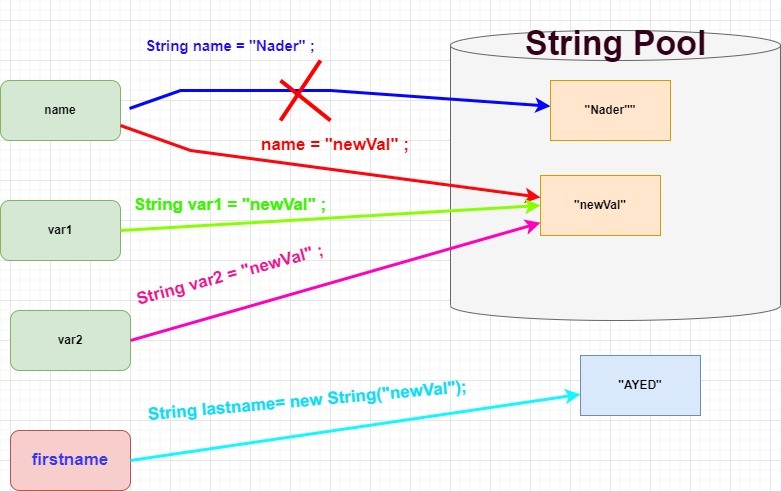Why Are Strings Immutable in Java? Understanding the Core Concepts
Why Are Strings Immutable in Java? Understanding the Core Concepts
Blog Article
What Is Immutable Strings and Exactly How It Works
In the realm of programming, understanding the concept of immutable strings is vital for creating secure and robust applications. Unalterable strings describe strings that can not be altered after they are created, ensuring data honesty and predictability within the code. This basic concept plays a vital role in numerous shows languages and supplies an one-of-a-kind approach to handling data. By discovering the ins and outs of exactly how unalterable strings work, one can reveal a globe of advantages and possibilities that can elevate the high quality and efficiency of software growth.
The Essentials of Immutable Strings
Unalterable strings, as a basic concept in programming, are character sequences that can not be altered as soon as they are produced. This indicates that once a string is appointed a worth, that value can not be modified. In languages like Python and Java, strings are immutable items, bring about various effects in terms of memory management and information integrity.
Among the essential advantages of unalterable strings is that they provide a complacency in data adjustment. Since the material of an unalterable string can not be modified, it makes certain that the original information remains intact, reducing the threat of unintentional modifications throughout program execution (Why are strings immutable in Java?). This property likewise streamlines debugging procedures, as designers can rely on that once a string is defined, its value will not be accidentally changed
When a brand-new string is created based on an existing one, rather than customizing the original string, the brand-new value is stored independently. On the whole, understanding the basics of unalterable strings is important for grasping programming concepts and maximizing code performance.
Benefits of Immutable Strings
Structure upon the security and performance advantages of immutable strings, their benefits extend to boosting code integrity and simplifying concurrent programs jobs. By being unalterable, strings can not be changed after production, which gets rid of the risk of unintentional changes in the information they save. This intrinsic immutability ensures that as soon as a string is created, its value remains consistent throughout the program's implementation, lowering the chances of insects triggered by unanticipated changes.
In addition, unalterable strings add to code integrity by making it simpler to reason concerning the state of a program. Given that strings can not be altered, developers can trust that a string will always hold the same worth, simplifying debugging and upkeep efforts. This predictability leads to much more stable and reliable codebases.

Implementation in Programming Languages
Within various programs languages, the consolidation of unalterable strings is an essential facet that impacts just how information is managed and adjusted within code structures. The implementation of unalterable strings varies throughout different programs languages, with each language offering its own mechanisms to support this idea.

In comparison, languages like C and C++ do not have integrated assistance for unalterable strings. Developers in these languages must by hand implement immutability by enforcing policies within their code to avoid direct modifications to string objects.
Best Practices for Collaborating With Immutable Strings
When dealing with unalterable strings in shows languages like Java and Python, sticking to best techniques makes certain effective and safe data control. One of the vital best methods is to make use of StringBuilder or StringBuffer rather of straight controling strings, particularly when managing substantial concatenation procedures. These classes provide mutable options for string manipulation, helping to prevent unneeded memory allocations and improving performance.
Another best method is to make use of string interpolation or format functions provided by the language rather than hands-on concatenation. This not only improves readability but likewise aids in avoiding usual challenges such as unintentional string adjustments. In addition, when collaborating with sensitive information such as passwords or API tricks, it is vital to stay clear of saving them as simple message in unalterable strings. Making use of secure storage devices like char arrays or specialized libraries for dealing with delicate info assists alleviate security like this risks related to immutable strings.
Real-world Applications and Examples
Checking out practical implementations of unalterable strings in numerous industries discloses their substantial effect on data stability and system dependability. In the medical care market, immutable strings play a critical duty in guaranteeing the security and privacy of person data. By preventing unauthorized adjustments to sensitive information such as clinical documents and prescriptions, unalterable strings aid maintain conformity with strict privacy a fantastic read guidelines like HIPAA.
Monetary organizations also take advantage of the unalterable nature of strings to improve the security of client data and deal records. Immutable strings help prevent scams and unauthorized alterations to financial information, supplying a robust defense against cyber hazards and guaranteeing the trust and confidence of clients.

Conclusion
Best techniques for working with unalterable strings include staying clear of straight modifications and making use of techniques that return brand-new string items. Real-world applications of immutable strings include information security, caching, and string manipulation tasks.
Immutable strings refer to strings that can not be changed after they are produced, making certain information integrity and predictability within the code. When a new string is created based on an existing one, instead than customizing the initial string, the brand-new value is stored separately.In languages like Java and Python, strings are unalterable find more information by default, suggesting that when a string object is developed, its value can not be altered - Why are strings immutable in Java?. Best methods for working with immutable strings consist of staying clear of direct modifications and utilizing techniques that return new string items. Real-world applications of immutable strings include data encryption, caching, and string manipulation jobs
Report this page